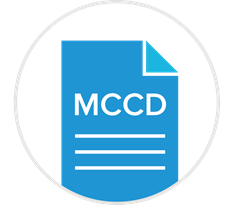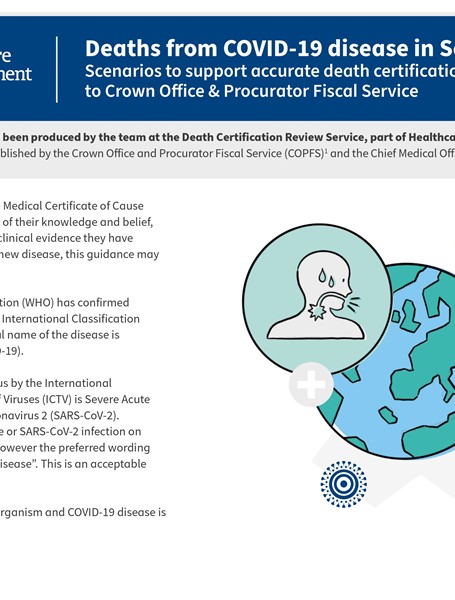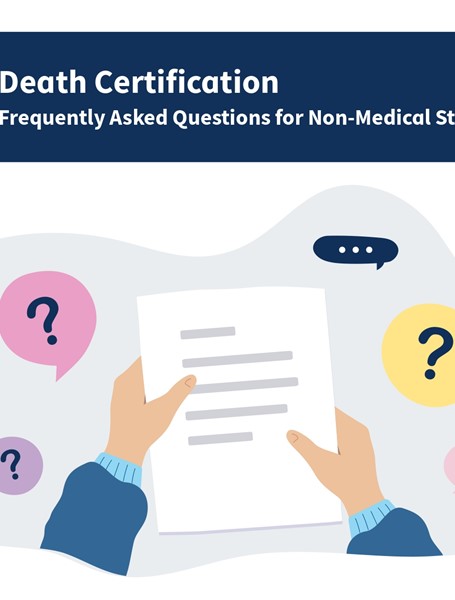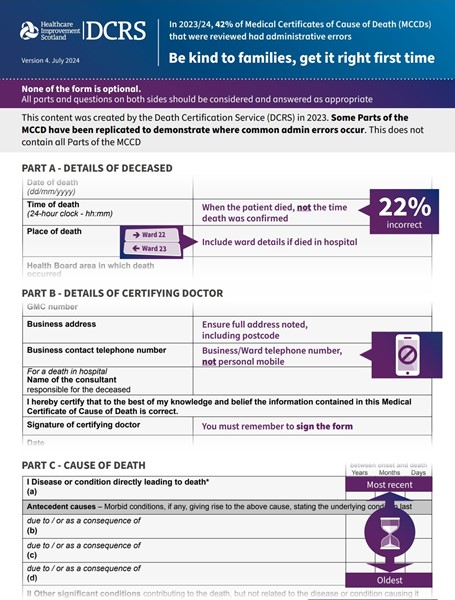For resources related to MCCDs in the context of the COVID-19 pandemic, please visit our dedicated webpage
The reasons for using abbreviations are:
- Those terms which are well known by clinicians and the public and do not cause confusion
- Those with characters more than that can be accommodated on the electronic MCCD form and where it is an accepted abbreviation in the WHO ICD-11 classification
Accepted abbreviations are:
- HIV - human immunodeficiency virus infection
- AIDS - acquired immune deficiency syndrome
- COVID 19 Disease or SARS-CoV-2- Coronavirus disease or Severe Acute Respiratory Syndrome Coronavirus 2
- CREST - calcinosis, Raynaud phenomenon, oesophageal dysmotility, sclerodactyly, and telangiectasia syndrome
- CADASIL - cerebral autosomal dominant arteriopathy with subcortical infarcts and leukoencephalopathy syndrome
- CARASIL - cerebral autosomal recessive arteriopathy with subcortical infarcts and leukoencephalopathy syndrome
- SCID - severe combined immunodeficiency
- IgG – Immunoglobulin G
- IgA - Immunoglobulin A
- IgM - Immunoglobulin M
Death certification serves both legal and health functions
A Medical Certificate of Cause of Death (MCCD) is a statutory requirement, it provides a permanent legal record of the fact of death and enables the family to register the death, make arrangements for the disposal of the body, and settle the deceased’s estate. In addition, a MCCD provides a record of causes of death for public health reasons.
a permanent legal record of the fact of death and enables the family to register the death, make arrangements for the disposal of the body, and settle the deceased’s estate. In addition, a MCCD provides a record of causes of death for public health reasons.
How to complete a paper-based Medical Certificate of Cause of Death form in Scotland
This animated short film guides certifying doctors through the process for completing a Medical Certificate of Cause of Death, or MCCD. An inaccurate MCCD can lead to further upset for people who are bereaved and delay funeral arrangements, so taking the time to complete the form in the right way can have a major impact. Also, by completing the MCCD accurately, certifying doctors are helping to provide better quality information about causes of death.
Click on the image to the right to watch the video or here to view it on the NHS Education for Scotland Vimeo channel
A transcript for this animation can be found here.
"When the Death Certification Review Service (DCRS) asked NES for help with a resource for all doctors on ‘How to complete a paper-based Medical Certificate of Cause of Death in Scotland’, we had not anticipated such an innovative outcome. The brief was a concise and readily understandable way to help certifiers refresh their knowledge both for planned CPD but also something that could be used ‘real-time’ when the need arose. Given the medicolegal importance of the production of an MCCD, especially for bereaved relatives, I have no hesitation in commending this material as the ‘go-to’ material in these circumstances" - Dr C George M Fernie, Senior Medical Reviewer & Caldicott Guardian, Healthcare Improvement Scotland, Death Certification Review Service
Death Certification e-Learning module
Note: You will need to login with your Turas account to access the below module:
 Certification of Deaths in the Community
Certification of Deaths in the Community
Turas Learn is a learning platform developed by NHS Education for Scotland to support health and social care staff in Scotland. Turas is open to all and any health and social care staff outwith Scotland can register for an account. If you do not have an account then please register for a free Turas account.
This e-Learning module covers certification of deaths in the community which will help you decide the appropriate next steps when dealing with a death in the community.
The module will help you understand:
- When you should report a death to the procurator fiscal service.
- When to issue a medical certificate of cause of death (MCCD).
- Potential issues when communicating with the police.
The module does not include material on communicating and interacting with families and other people who are bereaved.
A Guide to Death Certification Review in Scotland
Healthcare Improvement Scotland's Death Certification Review Service (DCRS) have a digital leaflet providing guidance on death certification review in Scotland - please visit the Healthcare Improvement Scotland DCRS website to access this document (Death Certification Review Service information leaflet).
A Guide to Death Certification Review in Scotland
Top Tips for Certifying Doctors
Deaths from COVID-19 disease in Scotland: Scenarios to support accurate death certification and reporting to Crown Office & Procurator Fiscal Service
This Scottish guidance has been produced by the team at the Death Certification Review Service, part of Healthcare Improvement Scotland. It is based on documents published by the Crown Office and Procurator Fiscal Service (COPFS) and the Chief Medical Officer.
Frequently Asked Questions for Non-Medical Staff
This is a short guide for non-medical staff who might interact with people who are bereaved, around the time of receiving the Medical Certificate of Cause of Death.
Click here or on the link to the right to download this guide.
Common Admin Errors
MCCDs can only be completed by a medical practitioner. For completion, definitive diagnostic proof (e.g. from tests or post mortem) is not required. Instead the statement is what, to the best of the medical practitioner’s knowledge and belief, is regarded to be the cause(s) of death.
Guidance for Doctors Completing Medical Certificates of the Cause of Death (MCCD) and its Quality Assurance (September 2022)
General points of note
-
An illegible paper form cannot be accepted by the Registrar for Births, Deaths, and Marriages, and will lead to a postponement in registering death and possible delay of the funeral
-
All entries must be completed clearly in black ink and BLOCK CAPITALS on the paper form
-
Timely and accurate completion of MCCDs is of great help to the bereaved families and friends as it reduces undue additional distress at an extremely difficult time
-
Health Boards should ensure that where a death occurs in hospital the consultant in charge of the patient’s care is involved in the completion of the death certificate wherever practicable, and that such involvement is clearly recorded in the patient records.




